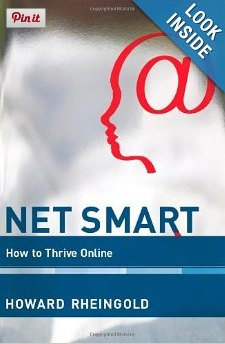PREFACE
Our cultural expectations have dramatically changed. A small example of that is telephone etiquitte. It used to be that you did not call anyone too early or too late. It was rude. You might be interrupting their sleep, or they might not be at home. Message machines seemed so impersonal at the beginning.
Today rudeness on the phone means not silencing a cellphone at a concert or talking on a cell when other people are in hearing distance. The hour you call and even if a person answers does not matter. The caller just leaves a message or texts. If you call someone at 3 in the morning it is no problem because you can just leave a message that they will get in the morning. Just like cell phone etiquitte, Participation, Collaboration and Network Smarts are important changes caused by technology in our lives.
Participation
It has become possible for everyone to publish what is important to them online in one way or another. In Facebook you can "like" something, you can bookmark favorite websites, you can comment on blogs, or if you want to do more create you own blog or website. There are so many sites like Facebook, Linked In, Pinterest, Etsy, Twitter, etc... that will allow you to publish your own thoughts and pictures on the web for the benefit of others.
If you participate you need to be aware of your digital footprint. Everything that you do online is permanent and you have no control of who reads it or copies and pastes it to their own computer. Hopefully you have all positive contributions that you are proud of. Your digital footprint shows you as a positive contributer. If you have posted some things that you are not proud of it is important to be active in publishing things that correct your digital footprint, so that anyone who views you online will more likely find your current footprint than what is history.
Collaboration
 Collaboration used to be considered cheating, but now it is necessary. Wikipedia is a good example. When I grew up Encyclopedias were sources of fact. You had to have a special shelf for them and they needed to be updated annually. The speed of new information increased and Encyclopedias could not keep up. Wikipedia allowed anyone to write or add to an article there are now 30 million articles. Collaboration allowed extremely current updating of information. People in locations of a disaster can add an article to show what is happening right then. The article on Hurricane Katrina was very interesting to follow because it changed in real time. If something untrue were added someone could come and correct it right away.
Collaboration used to be considered cheating, but now it is necessary. Wikipedia is a good example. When I grew up Encyclopedias were sources of fact. You had to have a special shelf for them and they needed to be updated annually. The speed of new information increased and Encyclopedias could not keep up. Wikipedia allowed anyone to write or add to an article there are now 30 million articles. Collaboration allowed extremely current updating of information. People in locations of a disaster can add an article to show what is happening right then. The article on Hurricane Katrina was very interesting to follow because it changed in real time. If something untrue were added someone could come and correct it right away.Since just anyone can add to it Wikipedia cannot be trusted as a final resource for information (actually, even the Funk and Wagnels could not!) However, it is a great place to start researching a topic. Usually there are links to follow at the end of an article that will take you to other information also.
Wikipedia is just one example of how Collaboration can make use of the Internet more meaningful. The general term for sites that allow this type of collaboration is Social Media. There are hundreds of sites on the Internet now that fall under that category.
Network Smarts

The final skill that I am going to summarize is more difficult to explain. The new way of relating to people is in a network rather than in a group. Sometimes you do not personally know someone, but on a social network site you are able to help them with an answer to a question. Networks make paying something forward (doing someone a favor even when they have not helped you) really meaningful. By being someone who gives you build Social Capital and trust.
Facebook can be an example of a network. You may see comments on your news feed that are not from people you know. You are connected to them only through someone else. How you respond to them can build Social Capital and trust.
It is important also for you to be mindful and to set your privacy settings so that you know who is seeing your contributions. You do not have total control and sometimes the privacy settings change, but it is important to know where you stand.
CONCLUSION
I know that these two posts have been more academic than most of my posts. It has helped me because at times I feel caught in changes that are going so fast. It helps to take time reflect and to be mindful of what I do online and how I help others.



No comments:
Post a Comment